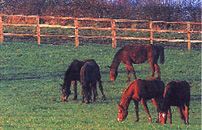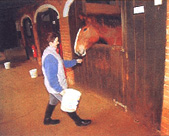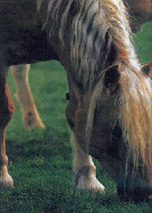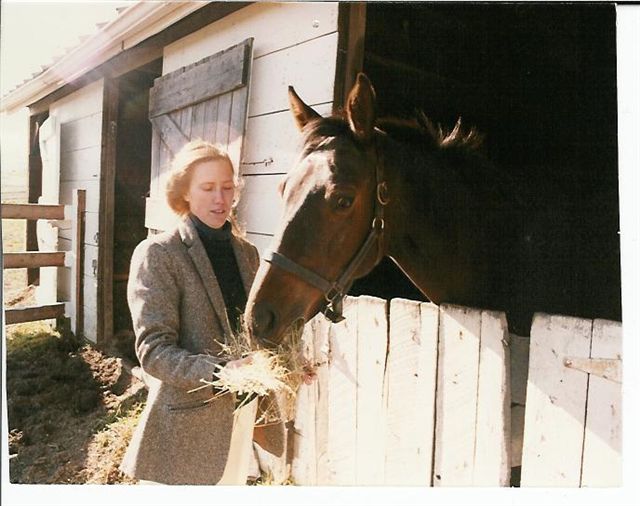|
Clarion Call Herbals
Equine Pasture Blend
Clarion Call
Herbals Equine Pasture Blend is a mix of herbs that helps supplement the grasses and herbs that nature intended. Presently,
this herbal combination is only available to horses that board at Coventry.

Clarion Call Herbals Equine
Pasture Blend benefits all horses including pleasure, show, racing and breeding. Make sure your horse enjoys herbs all
year long with our seasonal blends. Blends will be available for sale soon...
Why Clarion
Call Pasture Blend?
~ 100
% herbs - no fillers
~ All
natural health tonic
~ Promotes
general health
~ Natural
digestible source
~ Affordable
~ Horses
get the benefit of green pasture all year long
~ Cleanses
the blood & liver
~ Promotes
health coats & hooves
~ If
your horse does not get enough turnout, or if your pasture lacks fresh green grass and herbs
~ Horses love Pasture Blend!

Echinachea
The September,
2001 issue of Practical Horseman had an article by renowned veterinarian, Dr. Joyce Harman, "Helpful Herbs". Reading
positive articles about herbs helps us value and understand their use for our horses. Echinachea, Harman states, is so potent
that if you feed it singularly, only feed it for three weeks. Yes, herbs are potent and they do work. Echinachea particularly
boosts the immune system, but we all know that, because Echinachea and Goldenseal are everywhere. What you won't see anywhere,
however, is a pharmaceutical that boosts the immune system!
Herbs
are medicines and most pharmaceuticals are derived from herbs and then made synthetically. However, the herbs rarely have
the side effects of the synthetics. That is because they are naturally balanced within themselves. As Harman pointed out,
the salicylic acid in White Willow Bark (from which aspirin was derived in the 1930s by Bayer Corporation) has an antidoting
effect to prevent the stomach lining from being eaten away, unlike the salicylic acid when taken singularly in a synthetic
form, which burns the stomach lining. Of course, now we can buy buffered aspirin.
Another point of Harman's article was to be specific about the herbs you feed, and when and why, because if you feed Marshmallow
for a chronic cough in December and in February your horse's cough goes away, then you do not need it anymore. Instead, February
would be the time to start with herbs that will prevent a cough, such as Echinachea.
I feed Echinachea to my horses all winter long, along with several other herbs. Echinachea's abilility to boost the immune
system is best used before sickness sets in. But, if you, or your horse is already sick, Echinachea will also help localize
infection and stop it from spreading. It especially targets upper respiratory problems.
A Canadian study at the Equine Research Center at the University of Guelph documented how Echinachea boosts the immune system
by stimulating white blood cells to fight bad bacteria and infected cells (see Equus 291). The ERC also says not to feed Echinachea
over a long period of time. This is because the immune system should not be consistently boosted. Therefore, feed Echinachea starting in the fall and stop in the spring. Horses' systems,
like ours, work harder in the winter to stay warm, so the immune system is down, thus cold, flu, et al.
Echinachea is also antiviral, antibacterial, antifungal and antimicrobial. I never understood why several herbs do so many
things, and often found it confusing. Harmon's article clarified this, saying all the healing properties are still in the
herb, unlike the salicylic acid that was singled out. Thus, an herb's complex chemical constitution can influence the body
in several ways.
Horses are just the right animals to enjoy herbs since they live on various forms of grass. Did you ever check out what is
in that grass they graze on? Chamomile, Plantain, Dandelion, Red Clover - all herbs! So are dogs and cats and humans - we
all eat grass in some form.
Unfortunately I take better care of my horses than I do myself. My horses get their herbs daily, but for me to prepare my
morning Barley drink (grass) is a chore. What is it about us horse people? We'll
spend thousands of dollars on supplements for our horses and we still get sick as they munch comfortably in their clean stalls
with room service, recreation and a personal trainer! I do realize (in a small way) that if I don't take care of myself, what
good am I to my horses? The point being,
we should understand what herbs offer us and our equine friends, and use them with confidence.

Cayenne
Are you wondering why would I want to educate the reader about cayenne for horses? Well, simply
if you read the ingredients on your liniment bottle you will likely see that cayenne is one. Therefore, cayenne does have
a place in the barn. Certainly, I would not suggest sprinkling it over your horse's oats to flavor your grain! But, if you did use cayenne in this way, you could lower your horse's blood pressure, improve its metabolism
and regulate the heart. These are some of the healing qualities of cayenne that have been researched for people. However,
I do not recommend feeding it, unless of course your vet recommended its use.
Cayenne is also known to stop
bleeding (although I use golden seal root powder for this), and it is recommended if someone goes into shock. I imagine a
sprinkle under the nose could do wonders. Also, cayenne is widely known as a catalyst for other herbs. For example, if you
used cayenne with comfrey root oil (for healing), the cayenne would be a catalyst for the comfrey by helping the skin to absorb
the comfrey. It also works in this way as a liniment. I have yet to make a liniment
with cayenne, instead I use witch hazel and essentials oils. However, I use cayenne
for a different reason in my barn.
The Cayenne in my barns keeps those wood-eating
equines at bay; and the concoction I make is so simple, plus it provides a non-toxic approach to ward off those wood hungry
horses. Simply, buy some cayenne pepper (I get 16 ounces at Sam's Club) and a bottle of cheap corn oil. Use a safe clean jar
for storing in the barn with a wide enough lid for a paintbrush. Put about 2 ounces of the herb in the jar then fill the jar
with oil. Shake. Always shake before using and paint the wood chewed areas in the barn. Not only does the cayenne keep the
horses from chewing for a while, but the wood loves the oil! Several horse catalogs sell cayenne chew stop, but now you can
save some money and make your own.
Another way to use cayenne in the barn
is to mix the cayenne with some water and alcohol (cheap vodka will do) instead of oil and put it in a spray bottle. Shake
before using and spray on bandages to keep the horses from chewing them off.
And, before I forget, the most important
use for cayenne could be this - sprinkle a small amount of cayenne pepper in your shoes on those cold winter days - supposedly
it will stimulate the blood to keep your feet warm! I can't wait to try this!
 |
 |
|
A nutritious
treat for your horse!
One or more handfuls daily of the Equine Pasture Blend
are affordable, and benefit your horse all year long. ( No longer available)
Clarion Call Herbals Equine Pasture Blend can
also be used to make a tea for your horse's weekly bran mash. ( Take any herbs you are feeding your horses and make a tea....)
Devil's
Claw
Devil's Claw was discovered in Africa by western scientists in the sixties. Since then, scientific
studies in Germany and France have proved its value as a pain reliever and anti-inflammatory. Devil's Claw is known to have
the same effect as phenylbutazone, commonly known as bute and cortisone! Unfortunately pharmacists have not been able to synthesize
Devil's Claw's active ingredient, Harpagopbytum procumbems.
Recently, Devil's Claw has become so popular that you see it for sale every where for horses. Often it is sold as a tincture, rather than as a dried herb. A tincture is a potent
liquid herbal formula that will enter the horse's body immediately, whereas the dry herb often takes weeks to take effect.
Tinctures are commonly made from vodka, distilled water and your choice of herbs.
In order to make Devil's Claw tincture for your horse, buy a pound of Devil's Claw, a liter
of 80-proof vodka (the cheaper the better) and a gallon of distilled water. Get a glass container (like a huge one gallon
clean pickle jar), pour the herb into the jar, and cover with 1/2 distilled water and 1/2 vodka until the jar is full. Let
sit for two weeks minimum. The vodka and distilled water draw out different properties of the herb.
Once the herb is tinctured, you can either strain out the Devil's Claw and have pure liquid,
or keep the herb mixed with the liquid - this is what I do. Feed one ounce of the Devil's Claw daily over the horse's grain.
With this formula you will have enough tincture for your horse for at least three months and it costs about 30 dollars.
No one should be surprised that herbs like Devil's Claw are more commonly on the shelves at
the tack stores, especially since our horses are herbivores.
It has been advised to not feed
Devil's Claw to pregnant mares.

Dandelions
... equine delicacy
Spring is here and soon dandelions will be everywhere and our horses that can get to them will be devouring the flower
tops with with joy. Then strangely people will be poisoning the beautiful yellow "useless weed" with joy! Who knows better
the horse or the people?
Dandelions are hardly an eye-sore in my mind. When I see a dandelion I think liver cleanser
and that is what the horse is doing by eating them. The dandelion however, has so many healing aspects to it that cleansing
the liver is only one. I could write a book about the dandelion but that has already been done, and it is called, "Dandelion
Medicine" by herbalist, Brigette Mars.
This bitter weed, rather I mean herb, practically has an intelligence as the flower will close
when it is going to rain, and remain open when it is not. If growing under fruit
trees dandelions will give off a gas at sunset called ethylene, which helps fruit to ripen early and evenly! (Remember that
book the Power Of Plants?)
The
roots burrow deep into the earth and dandelions like to grow where the soil is healthy - our yards. The root is the part of
the plant one uses to cleanse the liver; the flowers, of course, are for making wine! Hilary Page Self the author of "A Modern
Horse Herbal" says she has reports of horses digging to get to the roots!!!
As a well known liver detoxifier
and strengthener, dandelion is sold as an over-the-counter drug in Germany for people with liver problems. Known to eliminate waste from the liver and lymph system, dandelion is also used as a diuretic to flush
toxins that cause inflammation. As a natural lasix treatment for horses it is high in minerals magnesium, calcium, copper,
iron and vitamins A, B, C and D.
Every year I make a spring tonic for my horses with Dandelion, Yellowdock, and Burdock roots
(the bitter herbs). I tincture the roots and feed 1 - 2 ounces of this tonic to my horses. Since my pastures are not abundant
in herbs and the natural forage a horse might get if not domesticated, I provide for them.
And, I take the tonic myself. Trust me, it tastes very bitter, but it is these bitter herbs that cleanse the liver.
A cleansed liver makes for a healthy body; my horses never get sick, and neither do I.
So this year maybe do something different, instead of calling Chemlawn, I know it will be
time consuming, but get a basket and go into the front yard and pick the dandelion heads. Your horses will be grateful.

Goldenseal
Everyone has heard of Goldenseal to help fight flu as it is used in combination
with Echinachea in many herbal cold medicines. However, as one of nature's golden herbs, Goldenseal's value has been acclaimed
for decades. In 1939 Goldenseal was among one of the most important herbs (drugs) in the European trade market to treat infections.
Known as an antibiotic, antiviral, antifungal, disinfectant, and antiseptic you can see why the plant in nearly extinct. Thirty
years ago, this member of the Buttercup family sold for 8 cents a pound, now it sells for 115 dollars a pound wholesale.
To afford Goldenseal, I buy the root in capsules and keep them in the house and in the barn.
I use Goldenseal to prevent infections on small cuts and scrapes, as an eye wash for barn kitties and the horses, and to treat
scratches (fungus). Now, everyone who knows me always asks for the Goldenseal when their horse gets a small cut. Usually, I wash the cut with a warm water and sea salt concoction (instead of betadine), then I pack the
wound with Goldenseal. Once the cut starts to heal I use Comfrey oil to speed the process.
Goldenseal is also known to stop bleeding and is used as a nasal decongestant. I tell friends
who are stuffed up at the barn to open a few capsules into a small bottle, shake and then snort - it clears the sinuses.
Used homeopathically Goldenseal is called Hydrastis, as this is the ingredient in the plant
that has all the healing power. Homeopathically, Hydrastis is used for the same
purposes. I keep a bottle in the barn and put it into the cats' water dish to keep them from getting too many of those kitty
colds and conjunctivitis. I also use it as an antibiotic for the horses and put it into their water buckets when needed. (Of
course, I use antibiotics from the vet when necessary.) Hydrastis ointment is also available as a homeopathic gel for wounds,
but I just prefer to use the root powder.
It is difficult to try something new, like using Goldenseal instead of Wonder Dust, or sea
salt instead of betadine, but treating your horses naturally is fun and interesting because we get to experience a direct
connection with nature healing and become less reliant on the veterinary products. One
book that highlights Goldenseal is Herbal Antibiotics, Natural Alternatives for Treating Drug-Resistant Bacteria
by Stephen Harrod Buhner. So learn and
enjoy the ancient healing powers of Goldenseal, "the golden herb", for you and your horses!
 |
|
 |
|
At Coventry we feed these herbs to our horses seasonally,
by adding them to the horses' grain. Each horse is fed herbs that would benefit that horse at that particular time.
There is a small extra charge for feeding the herbs to an owner's
horse, and Kristin can order them if the owner would like to add the herbs to his/her horse's diet. Just let her know and
she will gladly to this. During the summer season our
horses are fed garlic to encourage the flies to go away! All boarded horses are fed kelp, or Source daily for no extra
charge.
Let your horse be the judge!
| "I love my Clarion Call Herbals Pasture Blend!" |

|
| "I'll eat it with my grain or for a nutritious treat!" |

Chamomile
Chamomile flowers are an herb we have all heard
of that are good for sleeping or soothing a bellyache. I never really thought of feeding it as an herb for horses, yet it
grows all around the barns and horses devour it daily. It is no wonder, since it smells like apples. So why wouldn't a horse
eat chamomile? Then in researching for this article, I read in my horse herbals that it is used to ease mild colic and to
calm the nervous horse. The same reasons people would use Chamomile.
Jenny Morgan in her book "Herbs for Horses", states
that Chamomile can be fed safely to horses before competition to ease nerves without affecting performance. She recommends
feeding two handfuls a day, one in the a.m. and one in the p.m. with the grain. "Many
riders also benefit from a cup of Chamomile tea to sooth pre-competition nerves", states Morgan.
Used for mild colic, Chamomile eases cramping
and spasms. Victoria Ferguson who wrote, "The Practical Horse Herbal", says to syringe 100 ml of strained and cooled Chamomile
tea with a few drops of the Bach Flower Rescue Remedy into your horse every half hour till the vet arrives. An an anti-spasmatic,
and nervine herb, Chamomile used with Valerian, according to Hilary Page Self author of "A Modern Horse Herbal", will reduce
tension in the gut caused by anxiety.
One can also use the essential oil of Chamomile to reduce nervous tension and anxiety. Lavender oil is also known to
do this and my modern dentist puts little under my nose with every visit. To use on yourself, just put a little Chamomile
oil under your nose and inhale all day. And, be sure to put some under your horse's nose as well. Chamomile will not make
either a horse or human drowsy, but instead promote a feeling of well-being! Knowing this most certainly justifies the fact
that Chamomile tea is the number one selling herb tea on the market.
Other uses for Chamomile include using the tea
as an eye wash for swollen or sore eyes, a handful or two a day of dry herb for a nervous horse with runny manure, and/or
to help calm and heal a horse with ulcers....Ferguson also states that the "highest source of Calcium found with its metabolic
partner Phosphorus is Chamomile".
So, this little tiny herb that looks like a miniature
daisy and most suburbanites would call a weed, has several healing properties. My horses now eat Chamomile daily with several
other herbs. And, all I know is they certainly do not have stomach problems, and come to think of it none of them are nervous.
Perhaps I should start eating what I feed my horses!

You can share these cookies with your horse, if you want to!
Show Jitters Cookies
1/4 C dried or fresh chamomile flowers
1/2 C softened butter
1 C sugar
2 eggs
1/2 tsp vanilla
1 3/4 C flour
Carefully chop the camomile blossoms and set aside.
Cream butter and sugar; beat in eggs and vanilla.
Stir in flour and chamomile.
Drop by scant teaspoonfuls onto a lightly greased cookie
sheet.
Bake at 350 deg. F. for 10 minutes.
Thanks to Flower-Recipe egroup for this recipe.

Nettles...the
no-sting wonder herb
Nettles
is one of those power herbs. I consider it a daily multiple vitamin for my horses. Three main properties make nettles one
of my favorite herbs. It is a blood cleanser, treatment for anemia, and a source of minerals. Used internally, nettles will
cleanse the blood and remove uric acid (a cause of arthritis). Also, feeding nettles to pregnant mares helps increase milk
production, just as alfalfa does.
Stinging nettles is nettles before it has been dried or heated. After one of these processes, nettles becomes a friendly herb
rather than a stinging herb. People have used the stinging properties of nettles to relieve arthritis pain by rubbing the
fresh herb onto the painful area, to stimulate blood flow to that area and alleviate some of the pain. This worked in the
old days, but now a gentle cayenne cream works just as well.
Feed horses a handful of dried
nettles a day. A pound will last about six weeks. The dogs like is as much as
the horses do.
According to naturopathic doctor, Jack Ritchason in his book, The Little Herb Encyclopedia, "Nettles neutralizes uric
acid and prevents its crystallization, aiding in its elimination from the system, thus relieving gout and arthritis."
Hilary Page Seif, author of A Modern Horse Herbal, says nettles will stimulate circulation and is ideal for conditions
of laminitis, rheumatism and arthritis.
In an herb class I took, this alkalizing blood tonic herb was referred to as the "pee tea". Nettles is a diuretic and urinary
canal cleanser. An animal psychic told a friend that her horse requests nettles for his urinary tract! (Hey, why not?)
Nettles is a rich source of vitamin C, iron, chlorophyll and calcium. It is known to help in the absorption of iron, making
it a useful plant to treat and prevent anemia. People still eat nettles like steamed spinach. Remember, don't dress your salad
with fresh nettle leaves. Instead, add nettle flakes, or steam the fresh leaves.
Homeopathically, nettles is called Urtica and is used for skin rashes and hives, acute gout, rheumatism, to relieve burning
with urinating, and to increase milk production - all the same uses as herbally.


|
| Kristin & her horse Blythedale |
|
 |
|
|
|



